Your baby has reddened gums, drools a lot, is constantly chewing on something. The cheeks are red, the forehead is warm. A fever during teething is quite normal, that’s for sure. You think. Pediatricians are now sure that fever for children is not related to the teeth but basically indicates an infection.
If the baby also has diarrhea, you can be sure: It is not due to the teeth. Nevertheless, when teeth erupt, children are more susceptible and fever often. But why is that?
Table of contents
Fever During Teething? If The Baby’s Teeth Come Through, It Can Be Uncomfortable For The Parents
Teething is as uncomfortable for your baby as it is for you. Your child is restless, whiny, cries a lot – when the first teeth erupt at six months to one year, this is the normal state. The little teeth press against the jaw, the gums hurt, and the mucous membrane in the mouth just feels silly.
Of course, your baby doesn’t yet understand what exactly is going on. The mouth is just painful right now, and that needs to be made known. Researchers at Santa Catarina University in Brazil looked at data in a meta-analysis.
Ten large studies were compared, all dealing with teething in babies. The researchers found no evidence of fever during teething. However, the eruption of the first teeth (usually the incisors) is always accompanied by irritated gums.
There is also minor bleeding in the mouth, your child suffers from increased salivation. The body temperature increases slightly, but it remains at a maximum of 38° C. This is not yet a fever.
Symptoms Are Stronger When The Front Teeth Erupt
The baby’s teeth are already set in the jaw before birth. This includes both the milk teeth and the permanent teeth. Exactly when your baby’s teeth begin to grow and eventually erupt through the gums varies from person to person.
The timing of the first tooth also has nothing to do with the intensity of the symptoms. However, the front teeth, i.e. the incisors and canines, seem to cause your child more problems than the molars. And indeed, many parents find that the new teeth in the baby have often associated with infections.
However, the researchers in Brazil also found out that the fever during teething is actually not caused by the teeth, but by the infection, which is usually caused by viruses.
This can be diarrhea in the baby, but can also affect the respiratory tract. Some viruses can cause both colds and diarrhea in the baby, possibly even both at the same time.
Changed Life Situation From About 6 Months In The Baby
When your baby’s molars erupt later, your child will probably take it quite easily. Children no longer have a fever, but they are sometimes a little moody and seem stressed. Infections are rare.
This is explained by age. The baby’s first teeth appear at about six to eight months. This is the time when the nest protection slowly wears off. The child’s immune system learns to cope with common pathogens on its own.
Because you go out with your baby more often from this age on, it comes into contact with a large number of previously unknown pathogens. The immune system learns to deal with pathogens by fighting them – fever, mild diarrhea and a wet nose, cough and watery eyes are normal.
They are a sign that the immune system is doing its job. The immune system needs help only when the fever (during teething as well as at other times) rises above 39° C or your child has diarrhea for several days. Diarrhea is dangerous for the baby because the little body dehydrates very quickly.
At the age of twelve to sixteen months, the magic is over: your baby has built up a strong immune system of its own, it has learned about and defeated the most common pathogens. And the front teeth are also there.
When the molars start to grow, there is no longer a fever during teething. The temperature may still be slightly elevated, but most children do not notice much more. By the way, statistically speaking, the body temperature is always elevated exactly one day before the visible eruption of a new tooth!
Fever Is Not Expected During Teething, But Other Symptoms Are
There are a few signs that indicate that your child is teething. However, not all children show these symptoms, and they are not the same for every child (and every teether). If your child drools a lot and salivates constantly, this may be due to teething.
The new tooth presses on the mucous membrane and the gums. This stimulates the flow of saliva (just like food that is felt in the mouth). It is also possible that this increased salivary flow stimulates the production of stomach acid, which enters the lower digestive tract in greater quantities.
This, in turn, may make for somewhat dilute stools. The skin does not like the acid in the stool and may react with redness. If baby’s teeth are close to eruption, the gums are very sensitive.
Eating can be difficult, your child often wants to pick at things. He may refuse warm food and prefer to put his ice-cold fingers in his mouth. This cools the swollen and irritated gums, which are often also slightly sore or inflamed. A chilled teething ring will give your child relief now.
Feverishness Is Normal
Even without fever during teething, most children are very cranky now. They are irritable, cry a lot and often wake up at night. A general grumpiness is normal when the baby’s teeth are erupting.
The grumpiness is due to the pain in the mouth, and perhaps also to the badly grumbling digestive tract, which is not coping well with too much saliva and perhaps little food. Your baby doesn’t seem happy when teething, that’s normal.
If the gums are sore and swollen, your child likes to massage them while chewing. In the past, children were given a piece of hard stale bread to chew softly; today, chilled, nubby teething rings provide relief.
If your baby is very grumpy, always wants to be with you, and needs physical contact, you can also clean your finger and let your baby chew and suck on it. But be careful: children have a lot of strength in their jaws, and your baby doesn’t want to hurt you.
Restless Sleep Is Part Of It
Because teething is such a stressful time for the baby and he or she can hardly relax, he or she probably has trouble sleeping through the night. Many children wake up every half hour or hour, have bad dreams, and are restless during sleep. At the same time, eating habits are changed, because now there is a constant need to chew and bite.
At the age of six to twelve months, when the baby’s first teeth erupt, he also undergoes massive mental developments. He becomes more curious and may want to taste your food.
The first large quantities of complementary food can also lead to diarrhea in the baby, because the digestive tract first has to cope with the unaccustomed quantities of new food.
What You Should Know About Teething And Babies
- Fever during teething is not related to teething, but to infections.
- When the baby’s first teeth erupt, the nest protection slowly wears off. Your child becomes more susceptible to infections, and these are accompanied by fever.
- 1/3 of all babies show no symptoms when the teeth erupt, 2/3 of children have an elevated temperature.
- If the body temperature is up to 38.9° C, it is called an elevated temperature. If the body temperature is above this, it is a fever.
- Diarrhea in babies is not caused by teeth. If your child has diarrhea, it may be due to an infection or an allergy. A pediatrician should take a look.
- If your baby has an elevated body temperature of up to 38.5° C, you do not need to do anything. Only above this temperature should you ask a pediatrician for advice and, if necessary, lower the fever. Make sure that your baby drinks enough!
- When teething, the baby is very fond of putting all kinds of things into its mouth and biting on them. Not everything is clean – infections of the digestive tract can develop very easily now. Help your baby and offer him a disinfected teething ring. If the bottom is sore because your baby has diarrhea, you can treat the skin with lanolin.
You Can Support The Baby During Teething: Tips On How To Help Your Baby
How can you make the time of teething easier for your baby? Teething makes the baby chewy. You can support this. In the past, the first erupting tooth was the sign that children no longer had to be fed exclusively with breast milk, but were also allowed to carefully try the first “solid” food.
Today, the tendency is to feed the first porridge at the age of four months. Why is that? When your child is teething and wants to chew and bite a lot, he or she may be fed well-tolerated and unseasoned adult foods.
Watch your child so you can help immediately if he or she swallows or has a coughing fit. Soft-boiled pasta and potatoes (unseasoned and unsalted) can be eaten by your child as well as bread baked without additives.
If your child likes to bite hard things, you can leave the bread to harden for a few days. However, you should not give your child foods such as carrots or apples from which pieces break off when he or she bites on them. Your baby could choke on them.
Many children now also like teething rings that have been in the refrigerator. This is a bit stressful because the ring quickly gets warm again and your baby will probably ask for another, chilled ring – but the cold massage on the gums is good for the child.
The Most Important Thing Is Your Closeness
Be there for your baby during this stressful time. Your child needs you now. You can’t take away the pain, but your baby will feel more comfortable if he or she can have physical contact with you. A sling or comfort carrier is helpful at this time.
You should take diarrhea seriously: Always make sure your baby drinks enough. If your baby’s bottom is sore, he or she can spend half an hour without a diaper on a towel in the warmth of your home.
Because without a diaper, the skin can dry in the air and heal better. Healing wool in the diaper and lanolin help to protect the skin from sharp urine and aggressive stool.
If the skin does not want to heal, you can also dab your baby with cool black tea instead of a wet wipe when changing diapers. The tannins in green and black tea help the skin become more resilient and allow it to heal.
If the baby’s diarrhea persists or your child does not want to drink, you should consult a pediatrician. Elevated temperature does not need to be treated, but fever during teething is a reason to see your pediatrician. This is especially the case if the teething fever is accompanied by other symptoms such as diarrhea in the baby, cough, or cold.
Conclusion
Breaking through the first teeth is an uncomfortable time for your baby. That is why he is stressed, sleeps poorly, and seeks your closeness. One day before the tooth erupts, your baby’s body temperature is slightly elevated – but he or she does not have a fever during teething.
If your baby is feverish or has diarrhea, he or she is suffering from an infection. Then you should see the pediatrician.


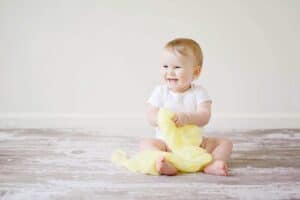
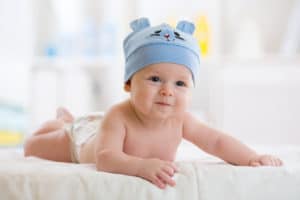
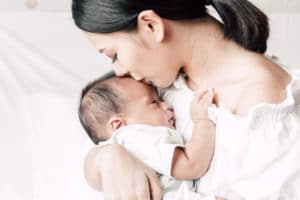
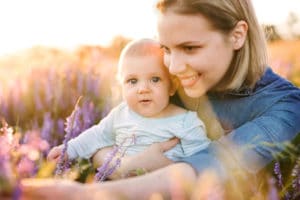
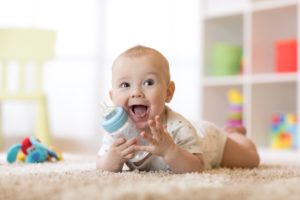
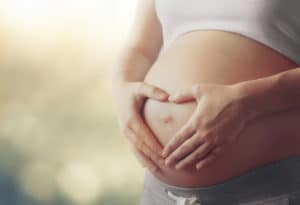

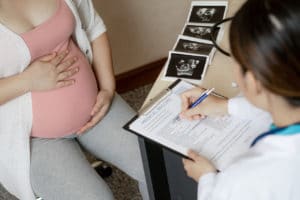

1 thought on “Your Baby Has A Fever When Teething? This Is What You Should Do Now”